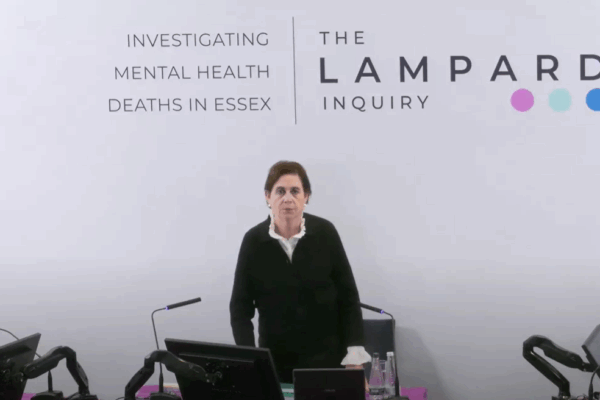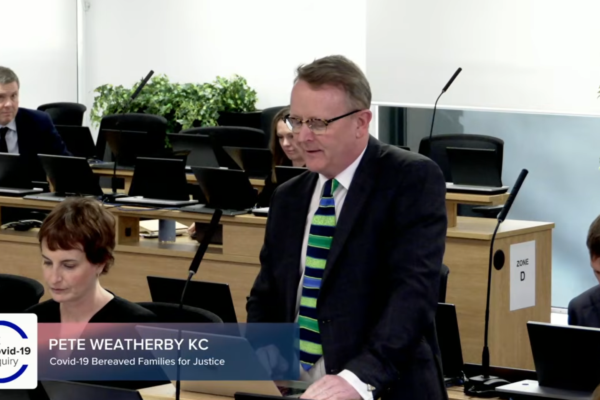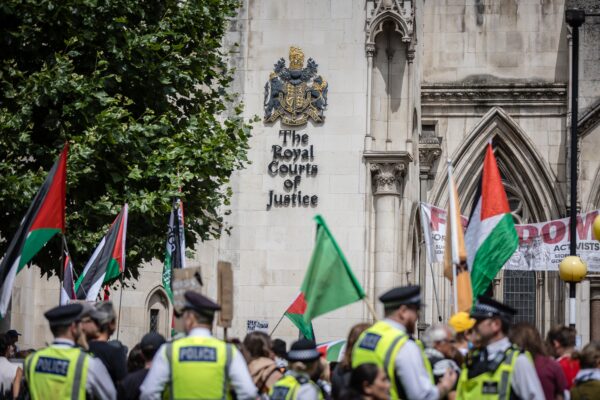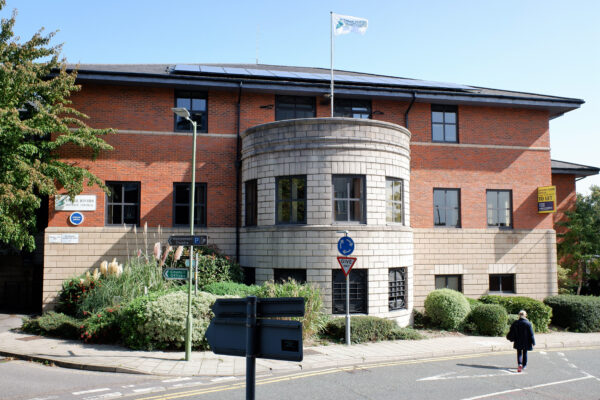Covid-19 Inquiry: Module 5 hears how government failures led to PPE shortages during the pandemic
4 April 2025
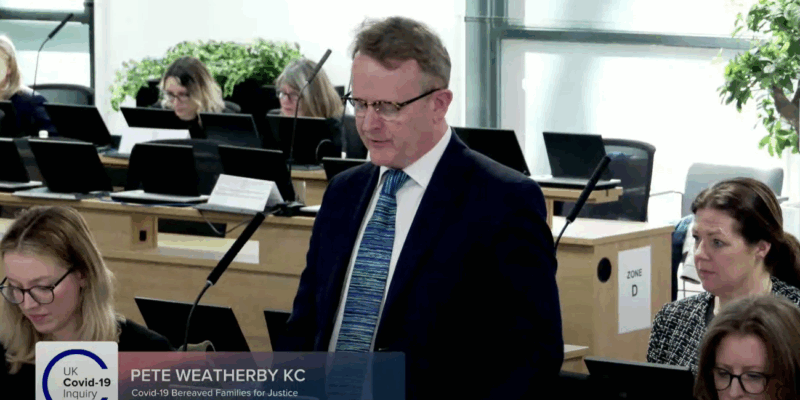
Garden Court North’s Pete Weatherby (pictured) delivers his opening submission during Module 5 of the Covid-19 Inquiry on 3 March, 2025. Credit: Covid-19 Inquiry / YouTube.
In March 2025, the Covid-19 Inquiry held its oral evidence hearings on how the UK government prepared for and responded to the challenges of procuring personal protective equipment (PPE) during the pandemic.
Across 16 days at the London Hearing Centre, the Inquiry heard from medical experts, NHS executives, government ministers and MPs, including Michael Gove (the then lead minister for the Cabinet Office) and Matt Hancock (the then Secretary of State for Health and Social Care), before Baroness Heather Hallett.
Evidence unequivocally demonstrated how government failures led to widespread shortages of PPE and lifesaving medical equipment, including ventilators and testing kits.
7,000 bereaved families
In April 2020, NHS nurse Janice Glassey was working what was meant to be her penultimate shift in Halton, Cheshire, before retirement. Janice worked with the out of hours district nursing team to administer end of life care to patients sent home from hospital or released back to care homes to die.
Due to a serious lack of PPE and even hand sanitiser, Janice became infected with Covid-19. She was first treated at Whiston hospital, were she spent a week on a ventilator in intensive care. She was then transferred to Liverpool Heart and Chest Hospital, where she tragically died on 24 April.
Her daughter Kerri Glassey, member of the Covid-19 Bereaved Families for Justice (CBFFJ), is one of hundreds of relatives of healthcare workers who lost their lives during the pandemic.
Kerri told the Liverpool Echo: “Mum was loved by everyone. She was so funny and had so much to look forward to. Mum was very dedicated to her job, she would regularly cover people’s shifts. We are devastated as we were looking forward to sharing so many occasions together.”
Her daughter had travelled from London to be with her mother during her final moments. “We are heartbroken, Mum was completely healthy,” she said.
Janice’s story and those of the other CBFFJ members, which number nearly 7,000 bereaved people in total, can be read on page four of the group’s written opening statement.
Simple answers, compelling questions
A founding member of Garden Court North Chambers’ and prominent figure on the Hillsborough Law movement, Pete Weatherby KC delivered a powerful opening statement on behalf of the CBFFJ, on 3 March 2025.
“The bereaved just want to know simple answers to compelling questions”, Pete began.
Those questions would set the precedent for the hours and days to come.
“Why, apparently, was there no emergency planning for supply chain disruption and surging demand, which was entirely foreseeable in a whole system emergency?”
“Why was there such limited stockpiling, and no central data system to know where stocks were or shortages were arising?”
“Why was there no emergency procurement process concentrating on existing suppliers, rather than a VIP lane and a desperate shout-out to unknown and opportunist profit-seekers?”
“Why did nurses face having to make their own PPE from bin liners whilst others lined their pockets?”
“Did businesses gain preferential access to procurement processes because of political patronage?”
Pete concluded by bringing to the fore what the CBFFJ want from the Inquiry.
“For the families, this isn’t about political point-scoring, it’s about scrutiny. Scrutiny as to whether cronyism, unfair advantage and corruption allowed chancers to make fabulous profits as the expense of all of us, the bereaved, the key workers.”
“No other country operated a VIP lane”
In his report for The Inquiry, procurement expert Professor Albert Sanchez-Graells dissected the flaws of the VIP lane – which accounted for almost 50% of purchases through the PPE Buy Cell.
Professor Sanchez-Graells was critical of the approach and found no evidence of similar prioritisation in Scotland, Wales, Northern Ireland, or other countries around the world.
As put by Pete Weatherby KC: “No other country operated a VIP lane which catered for friends of government ministers, so why did the UK?”
Matt Hancock, Michael Gove and other parliamentarians continued to defend the government’s VIP lane throughout Module 5, despite the High Court ruling that it was “unlawful” and breached all laws on equal treatment to potential suppliers and prevention of profiteering.
During his fifth appearance at the Covid Inquiry, Mr Hancock said he was “not at all surprised” when the VIP lane for PPE suppliers with a political connection was set up, describing it as “standard practice”.
When asked by Garden Court North’s Anna Morris KC on what basis he was still providing assurances that there remained approximately ten weeks of PPE supply left in March 2020, Mr Hancock replied: “I was given some advice at that time … I think the question you’re getting at comes from the evidence of Mr Cummings but we’ve already seen that is not reliable evidence”.
Dominic Cummings was the chief adviser to Prime Minister Boris Johnson during the Covid-19 pandemic.
“The Chair has got evidence from Module 2 from Mr Cummings. What my question is really getting at is did you [Mr Hancock] attempt to downplay PPE shortages in March 2020?”, Anna then asked. Mr Hancock denied downplaying shortages and again placed blame with Mr Cummings.
Anna responded that Mr Hancock’s view of Mr Cummings was not relevant, and focused on the previously discussed “comms package” distributed to district from the state of PPE in March 2020. It was previously reported that NHS England came within “six or seven hours” of running out of gowns and other PPE at that time.
Despite this, Lord Theodore Agnew described it as “bollocks” to suggest that the VIP lane was “some kind of plan by right-wing people trying to enrich themselves”.
In response to Anna, Agnew said: “There was no heinous plan to enrich a few of our mates. It is such bollocks. We were in the most terrible position. There was no doubt one or two crooks and cranks, but they were largely credible, which is borne out in the volume of stuff that they ended up delivering.”
Representatives from the British Medical Association (BMA), the NHS Federation, and the Federation of Ethnic Minority Healthcare Workers also gave evidence regarding the impact of inadequate and insufficient PPE on front line health and social care workers. The BMA’s Professor Banfield described it as “woefully inadequate”.
Mr Hancock also criticised the overarching line of questioning as “naïve”, “hostile” and “inappropriate”, prompting an intervention from Baroness Hallett, who told Mr Hancock it was her job to learn lessons for any future pandemic, and that the Inquiry is not all about “criticising people”.
Inquiry calls no suppliers
As much as he directed focus to maintain scrutiny on those responsible for creating the VIP lane, Pete also pointed out the Inquiry’s shortcomings, namely its lack of focus on suppliers.
“For example, the Inquiry will not be able to ask David Meller of Meller Designs Ltd, a donor to the Tory party and to Mr [Michael] Gove’s leadership campaign in 2016, how his company – a fashion house – was in a better position to source PPE than firms which had specialised in doing just that for years”, Pete said.
“Why was a fashion house with pre-pandemic profits of £143,000 being so heavily promoted by ministers? Meller Design’s profits rose to £13 million as a result. A significant volume of the goods supplied were unfit for NHS use.”
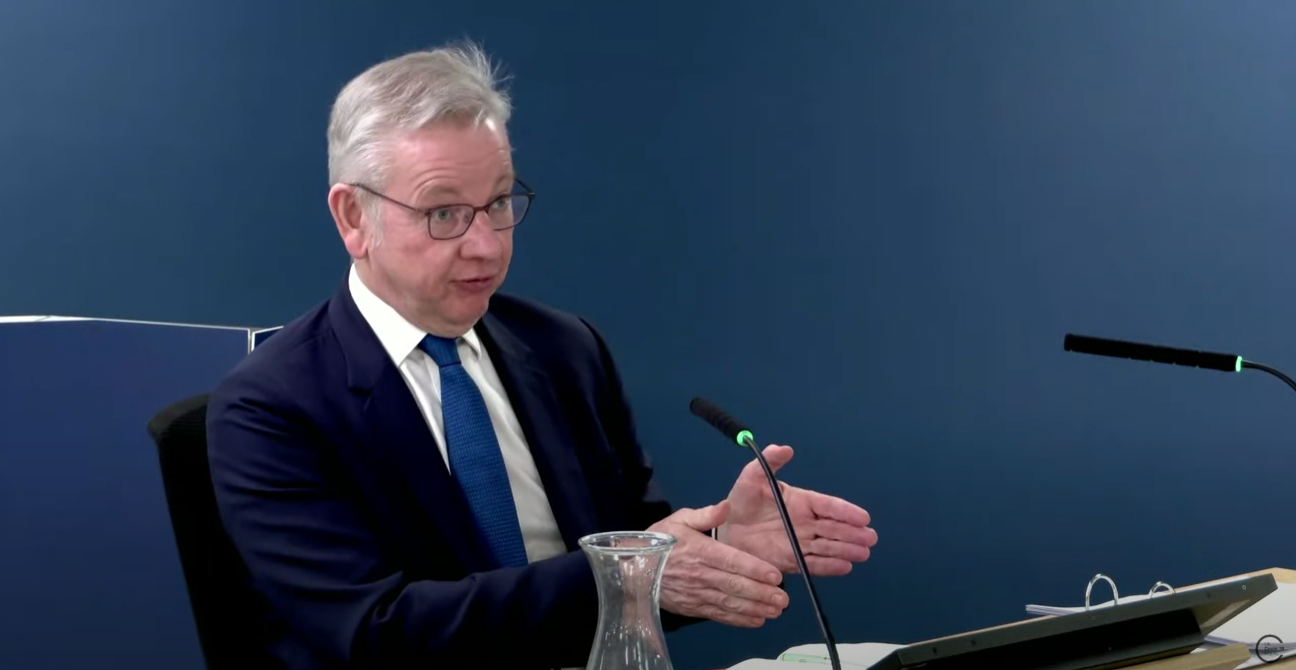
Dyson is another such example. Mr Gove came under scrutiny in the questioning of Richard Wald KC, counsel to the Inquiry, which asked why Mr Gove wanted to “circumvent” the Medicines and Healthcare products Regulatory Agency (MHRA) to push through a bid by James Dyson to supply NHS ventilators.
By not calling suppliers to give evidence, the Inquiry rendered itself unable to hold accountable those for whom political patronage was a key factor in getting fast-tracked access to favourable contracts.
“The decision not to call these suppliers will be seen as a lost opportunity to establish the true facts and bring a measure of accountability”, Pete added.
In the real world
At the heart of the Covid Inquiry’s Module 5 lies the stark failure by the government to “Protect the NHS, Save Lives” through PPE provision, as Downing Street’s hollow statement rang.
“Politicians have sought to paint a picture to this Inquiry that only they lived in ‘the real world’, which the rest of us could never understand in terms of the pressures, decisions and difficult phone calls they had to make in procuring PPE”, Anna said in her closing statement on 27 March. “They claim that the PPE procurement exercise was an unmitigated success and that they would not do anything differently.”
The real-world impact was, of course, far wider-reaching.
From Janice Glassey to Femi Akinnola, a social care worker who died from Covid-19 due to a lack of available PPE, there is dehumanising hypocrisy in the parliamentarians decisionmakers’ complaints that the Inquiry ‘simply cannot understand’ the pressures they faced.
“In the real world, this meant that there were patients, clinicians, health and social care workers exposed to preventable infections from Covid 19. Primary care members reported having to rely on local shops, beauty and tattoo parlours to access PPE supplies, at times having to use crowdfunding to buy equipment,” Anna said. “In the real world, this meant that people were prevented from seeing their loved ones in hospitals and care homes.”
Inadequate contracting also decimated the public purse, the economic impact of which is still being felt today.
During the pandemic, the government spent £8.6 billion of public money on PPE through the hastily formed PPE Buy Cell. A lack of preparedness and inefficient procurement systems resulted in £3.8 billion of wasted PPE that could not be used in the NHS.
“Good governance matters, standards matter, transparency matters. Better procurement means that governments can spend their money faster and better in times of emergency”, Anna concluded.
“My Lady, your Inquiry should be clear in its findings about the failings of the UK’s pandemic procurement. After four weeks of evidence at further expense to public funds, it cannot shy away from making criticisms of the VIP Lane and those who profited from it. We also urge you to make clear recommendations for the future, that insist on a foundation of good data, good governance, ethical practices and transparency. The public and the bereaved families expect no less.”
For Module 5, Garden Court North Chambers’ Covid Inquiry team comprised Pete Weatherby KC and Anna Morris KC, who led Lily Lewis, Hamish McCallum, Mira Hammad and Christian Weaver. Our barristers were instructed by Nicola Brook from Broudie Jackson Canter.
Public hearings for Module 7 will begin on 12 May 2025, addressing the approach to testing, tracing and isolation adopted during the pandemic.
Module 6’s public hearings on the care sector will begin on 30 June 2025.
For further information, please contact Alex Blair, Communications Manager at Garden Court North Chambers: ablair@gcnchambers.co.uk


